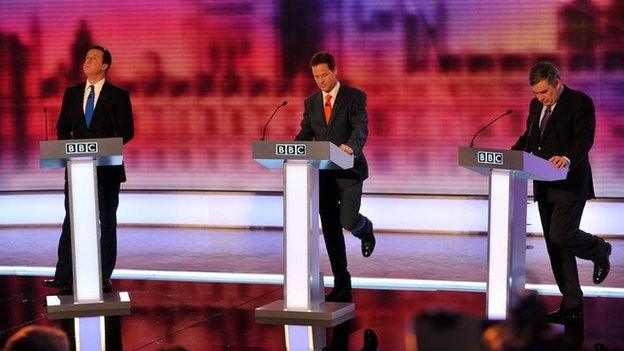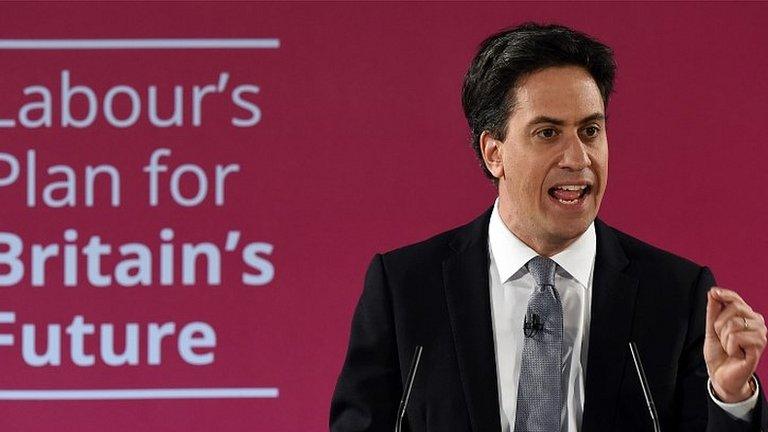TV election debates - who blinks first
- Published

The 2010 election had the UK's first prime ministerial TV debates
A high-stakes poker game in which the ultimate prize is power - that is what the row about the party leaders' general-election TV debates has now become.
The players at the table are not just the nation's party leaders but also the bosses of the country's biggest broadcasters.
Watching and waiting are highly paid lawyers who know that this may end up being resolved by a judge and not by the court of public opinion. The question is - will anyone blink before it gets to the court-room?
Ed Miliband, Nick Clegg and Nigel Farage have now tried to turn up the heat on David Cameron.
Perhaps more importantly, though, they are trying to put pressure on the BBC, ITV, SKY and Channel 4 to call Mr Cameron's bluff and go ahead with the debates even if he fails to show up - the so-called "empty-chair" or "empty-podium" strategy.
None of this will surprise the prime minister. He decided long ago - I first wrote about it in my book, which was published three years ago - that the debates at the last election had sucked the life out of the campaign and given a boost to his opponents.
His chances of staying in Downing Street depend on squeezing the UKIP vote, so he's unwilling to do anything that gives Nigel Farage a boost. He's ready to be called a chicken, because in the end he believes that people don't choose their next prime minister by judging who's most willing to go on the telly.
What then about the broadcasters? They've linked arms and vowed to stick together. All agreed that UKIP could not be excluded given their performance in recent elections and polls.
They also agreed that the Greens could and should be excluded because although they've outpolled the Lib Dems occasionally, their performance in elections - Westminster, council and European - is much less significant. On Thursday the BBC Trust will publish a paper showing how it came to this judgement.
Empty-chairing Mr Cameron sounds tempting, but it is a very big step for broadcasters to take. They will, inevitably, have to consider not just how fair it would be, not just whether it would breach their legal obligations, not just whether it would make good television, but also the politics of it.
BBC guidelines don't cover election debates, but they do state that no election candidate can veto a debate in their constituency simply by refusing to turn up. They also spell out that no-one can expect to stop a programme going ahead simply because they don't want to take part.
However, any broadcast executive would take a very large gulp before airing a debate on the eve of an election with one party not represented.
It would be easier if all the broadcasters do this together, but it may be that one shows more courage (or recklessness depending on your point of view) and does it alone.
What's more, the BBC needs politicians to agree to renew its charter and licence fee. ITV and Channel 4 always have worries about government regulation. And the Sky takeover row is a reminder that they too are not immune from politics.
So, don't expect anyone to blink just yet, but there are many weeks to go.
Don't forget, too, that in the US there was a gap of 16 years after the first presidential debate in 1960. So, it should come as no surprise if staging the UK's second set of TV debate is proving a little tricky.
- Published5 January 2015
